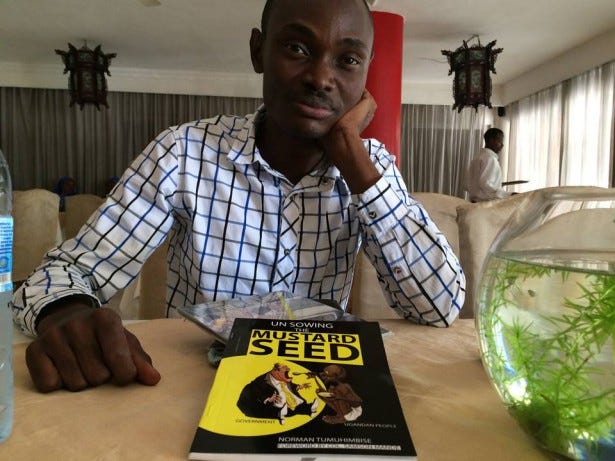Dissident Spotlight: Norman Tumuhimbise
Norman Tumuhimbise is one of many victims of a leader's thin skin and quick resort to "offensiveness" as a crime against the state.

On March 30, 2022, Ugandan author Norman Tumuhimbise was set to launch a book on the corruption of his country’s president (dictator), Yoweri Museveni.
The Liars and Accomplices was the kind of political exposé that an author like Bob Woodward could publish freely in the United States. Instead, Tumuhimbise was among nine journalists who were arrested a few weeks before the book’s publication date. He and his fellow writers and journalists were also tortured for their platform’s criticism of the dear leader.
Tumuhimbise was charged with relaying “offensive information” and even cyber-stalking Museveni in the course of researching The Liars and Accomplices and Tumuhimbise’s 2015 book, Unsowing the Mustard Seed.
Tumuhimbise was released on a 500,000-shilling bail — about $136 — and remains active as a journalist. Both of his books describing his president’s corruption leading into office and during his term are available on Amazon.
Invoking Offensiveness is a Slippery Slope
Despite the enormous power they hold, authoritarian leaders are notoriously thin-skinned. They want to be viewed as legitimate leaders even as they maintain their power through force instead of persuasion.
Using offense to shut dissent down is a cheap trick that authoritarians often rely on. Since the personality of the leader is merged with the state, a slight against the person becomes a crime against the state. It’s one of the reasons why there’s great wisdom in moving leaders in and out of power.
Leaders in democracies must be thick-skinned enough to be told by any of the country’s citizens how much they hate the president or members of Congress. Politicians should be protected from violence, but not from criticism, especially when critics simply describe the leader’s behavior.
A lot of online political commentary laments political polarization in the United States, and for good reason. But a tumultuous conversation about the country’s future and its leaders is preferable to its elimination altogether.

